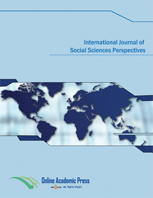Factors Predicting the Culture Shock of Peace Corps Volunteers in the Western China Universities
DOI:
https://doi.org/10.33094/7.2017.2019.52.36.46Keywords:
Culture shock, Adaptation, Peace Corps volunteers, China.Abstract
This study investigated the factors predicting the culture shock of Peace Corps volunteers in the universities in the western China. The results revealed that length of stay and gender were not significant predictors for culture shock. Though no significant difference was found between length of stay and culture shock, length of stay in this study showed a negative predictive effect on culture shock. Education background was a significant negative predictor for culture shock. A strong correlation was found between culture shock and homesickness. Homesickness accounted for 53.5% of the variance in culture shock. Feelings toward China also were found to be correlated to culture shock and could account for 26.6% of variance in culture shock. Multiple Regression Analysis showed homesickness and feelings towards China had a direct effect on culture shock, satisfaction with the life in China had indirect effect on culture shock with homesickness and feelings towards China as mediating variables.




